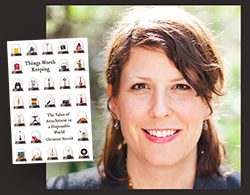Rampant consumerism has inundated our planet with pollution and waste. Yet, attempts to create environmentally friendly forms of consumption are often co-opted by corporations looking to simply “sell us more stuff!” In Things Worth Keeping, Christine Harold investigates the attachments we form to the objects we buy, keep, and discard, and explores how these attachments might be marshalled to create less wasteful practices and balance our consumerist and ecological impulses.
Although all economies produce waste, no system generates as much nor has become so adept at hiding its excesses as today’s mode of global capitalism. This book suggests that managing the material excesses of our lives as consumers requires us to build upon, rather than reject, our desire for and attraction to objects. Increasing environmental awareness on its own will be ineffective at reversing ecological devastation, Harold argues, unless it is coupled with a more thorough understanding of how and why we love the things that imbue our lives with pleasure, meaning, and utility.
From Marie Kondo’s method for decluttering that asks whether the things in our lives “spark joy” to the advent of emotionally-durable design, which seeks to reduce consumption and waste by increasing the meaningfulness of the relationship between user and product, Harold explores how consumer psychology and empathetic design can transform our perception of consumer products from disposable to interconnected. An urgent call for rethinking consumerism, Things Worth Keeping shows that by recognizing our responsibility for the things we produce, we can become better stewards of the planet. University of Minnesota Press
Note: In addition to Dr. Harold’s free public lecture on Things Worth Keeping: The Value of Attachment In A Disposable World at The Liberty Theatre on Saturday, October 19, 7pm, each performance of Company of Fools Play Reading of Lifestyle of the Richard and Family (Oct 18, 7pm and Oct 19, 2pm) will be followed by a discussion on the future of AI and cultural expression with Dr. Harold and the cast.
About Dr. Harold: Christine Harold is Professor and Chair of the Department of Communication. She teaches courses in rhetorical criticism, rhetorical theory, and popular cultural studies. Her scholarship analyzes the politics of consumerism and explores opportunities for meaningful political action in a world increasingly defined by the logic of the marketplace. Her forthcoming book, Things Worth Keeping: The Value of Attachment in a Disposable World (2020, University of Minnesota Press), looks at the relationship between mass production, product attachment, and consumer waste. Her first book, OurSpace: Resisting the Corporate Control of Culture (2007, 2009 University of Minnesota Press) evaluates strategies of resistance to the commercialization of public life. Among other venues, her work has appeared in Public Culture, Rhetoric and Public Affairs, Critical Studies in Media Communication, and JAC. Dr. Harold serves on the editorial boards of the Quarterly Journal of Speech, Western Journal of Communication, and Communication and Critical/Cultural Studies.
Part of The Center’s BIG IDEA project Marketplaces: From Open Air to Online.




